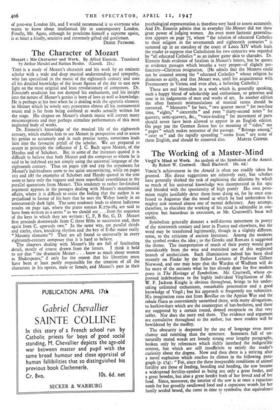The Character of Mozart
Mozart : His Character and Work. By Alfred Einstein. Translated by Arthur Mendel and Nathan Broder. (Cassell. 21s.) Tins is a study of Mozart's character and his work by an eminent scholar with a wide and deep musical understanding and sympathy, who has specialised in the music of the eighteenth century and uses all his detailed knowledge of the lesser figures of the day to cast new light on the most original and least revolutionary of composers. Dr. Einsteires erudition has not damped his enthusiasm, and his insight into the nature of Mozart's genius is born of love as well as knowledge. He is perhaps at his best when he is dealing with the operatic element in Mozart which he wisely says penetrates almost all his instrumental music and is far from being confined to works actually written for the stage. His chapter on Mozart's church music will correct many misconceptions and may perhaps stimulate performances of this most neglected body of works.
Dr. Einstein's knowledge of the musical life of the eighteenth century, which enables him to see Mozart in perspective and to assess his genius so accurately and in such precise terms, sometimes leads him into the favourite pitfall of the scholar. We are prepared to accept in principle the influence of J. C. Bach upon Mozart, of the Haydns and of Schobert. But in some of the instances quoted it is difficult to believe that both Mozart and the composer to whom he is said to be indebted are not simply using the universal language of the eighteenth century. Thus on pages 136 and 219 the arguments for Mozart's indebtedness seem to me quite unconvincing, while on pages 115 and 187 the examples of Schobert and Haydn quoted in the text seem to have only the vaguest and most superficial resemblance to the parallel quotations from Mozart. This tendency to rather far-fetched argument appears in the passages dealing with Mozart's matrimonial affairs, where it is difficult to resist the feeling that the author is so prejudiced in favour of his hero that he sees the Weber family in an unnecessarily dark light. The same tendency leads to almost ludicrous results on page 240, where the piano sonatas K.279-284 are said to have been written as a series "as we should see ... from the sequence of the keys in which they are written : C, F, B flat, G, D. Mozart first proceeds downwards from C three fifths in succession and, then again from C, upwards two." In the same way, are parallel thirds and sixths, slurs, knocking rhythm and the key of E-flat major really "Masonic elements "? They are all found so universally in every eighteenth-century composer that it is hard to believe. The chapters dealing with Mozart's life are full of fascinating detail, mostly of course drawn from the letters. I think it bold to say that "the dramatist Mozart. . . knew as much about women as Shakespeare," if only for the reason that his librettists must have been at least partly responsible for the creation of all the characters in his operas, male or female, and Mozart's part in their psychological representation is therefore very hard to assess accurately. And Dr. Einstein admits that in everyday life Mozart did not show great power of judging women. An even more fantastic generalisa- tion appears on page 77, where "the relation of educated Catholics to their religion in the seventeenth and eighteenth centuries" is summed up in an anecdote of the court of Louis XIV which leads the reader to suppose that Catholicism for two centuries was regarded by "all educated Catholics" as an indoor game akin to charades. Dr. Einstein finds evidence of fatalism in Mozart's letters, but he quotes as evidence passages which breathe a very proper--if slightly per- functory—Christian resignation. (He admits that the Mozarts could not be counted among the "educated Catholics" whose religion he dismisses so airily, and that Mozart was, until his acquaintance with Freemasonry in Vienna and even after, a believing Catholic.)
These are real blemishes in a work which is, generally speaking, such a happy blend of scholars* and enthusiasm, so generous and sane in its judgements of men and works of art. In another edition the often fantastic mistranslations of musical terms ahould be corrected. " Measures " for bars, "two quarter meter" for two-four time, "eights," " sixteenths " and even "thirty-second notes" for
quavers, semi-quavers, &c., "voice-leading" for movement of parts should never have been allowed to appear in an English edition.
On page 300 the German Seiten has its meaning of "sides," not " pages " which makes nonsense of the passage. "Belongs among," "cater to" and the rapidly spreading "stems from" are none of them English, and should be removed also. MARTIN COOPER.


































 Previous page
Previous page